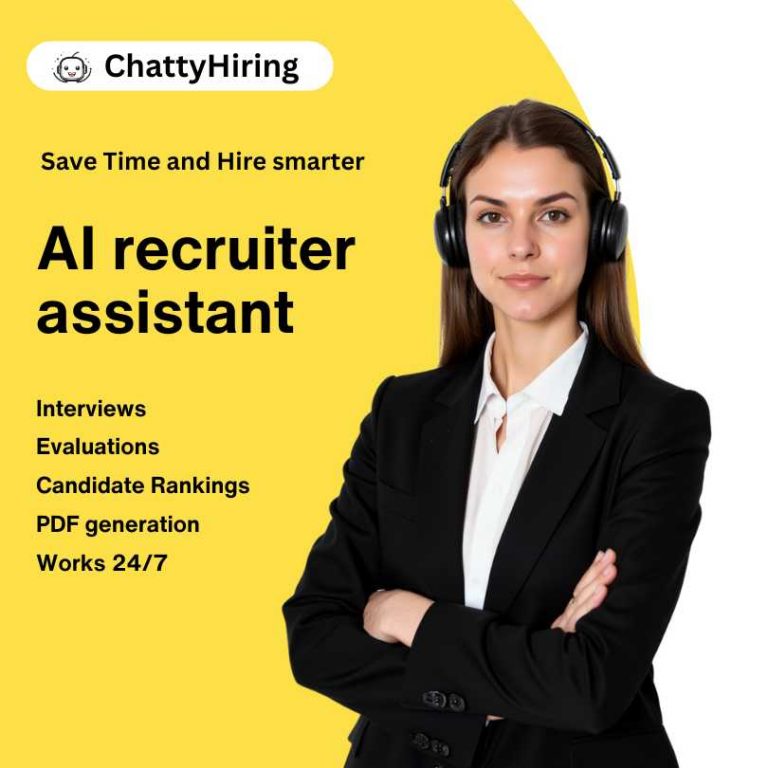The integration of artificial intelligence (AI) technology into the recruitment process has revolutionized the way organizations conduct interviews. Traditionally, interviews have relied heavily on human judgment, which can be influenced by biases, emotions, and subjective interpretations. However, with the advent of AI, companies are now able to leverage advanced algorithms and machine learning techniques to enhance the efficiency and effectiveness of their hiring processes.
AI technology can analyze vast amounts of data, identify patterns, and provide insights that were previously unattainable through conventional methods. AI technology in interviews encompasses a range of tools and applications, from automated resume screening to virtual interview platforms that utilize natural language processing. These innovations not only streamline the recruitment process but also improve the candidate experience by providing timely feedback and personalized interactions.
As organizations increasingly recognize the potential of AI to transform their hiring practices, it is essential to explore the various benefits, challenges, and ethical considerations associated with this technology.
Key Takeaways
- AI technology in interviews is revolutionizing the hiring process by automating tasks and providing valuable insights.
- Using AI technology in interviews can lead to improved efficiency, reduced bias, and better candidate experiences.
- AI technology streamlines the interview process by automating candidate screening, scheduling, and even conducting initial interviews.
- Overcoming challenges with AI technology in interviews requires careful consideration of potential biases, data privacy, and ensuring a positive candidate experience.
- Ethical considerations in using AI technology in interviews include transparency, fairness, and ensuring that candidates are treated with respect and dignity.
Benefits of Using AI Technology in Interviews
Improved Candidate Evaluation
AI algorithms can evaluate candidates based on their skills, experience, and cultural fit, leading to more informed hiring decisions. This approach ensures that the most qualified candidates are selected, rather than those who may have an unfair advantage due to personal biases.
Streamlined Recruitment Process
AI technology can significantly reduce the time and resources spent on the recruitment process. Automated resume screening tools can quickly sift through thousands of applications, identifying the most suitable candidates based on predefined criteria. This not only accelerates the initial stages of recruitment but also allows human resources professionals to focus on higher-value tasks, such as engaging with candidates and conducting in-depth interviews.
Increased Efficiency and Competitive Advantage
By streamlining these processes, organizations can fill positions more efficiently and reduce the time-to-hire metric, which is crucial in competitive job markets. This enables companies to stay ahead of the competition and secure top talent before their rivals do.
How AI Technology Streamlines the Interview Process

AI technology streamlines the interview process through various innovative applications that enhance both efficiency and candidate engagement. One prominent example is the use of chatbots for initial candidate interactions. These AI-powered chatbots can conduct preliminary screenings by asking candidates a series of questions related to their qualifications and experience.
This not only saves time for recruiters but also provides candidates with immediate feedback regarding their suitability for the role. Additionally, AI-driven video interview platforms have emerged as a game-changer in remote hiring. These platforms utilize facial recognition and voice analysis technologies to assess candidates’ non-verbal cues and communication skills during virtual interviews.
By analyzing factors such as tone of voice, body language, and even word choice, AI can provide valuable insights into a candidate’s personality traits and cultural fit within the organization. This level of analysis allows recruiters to make more informed decisions while also creating a more engaging interview experience for candidates.
Overcoming challenges with AI technology in Interviews
Despite the numerous benefits associated with AI technology in interviews, several challenges must be addressed to ensure its successful implementation. Here is our top 4:
| Challenges | Impact | Solution |
|---|---|---|
| Implementing AI efficiently with clear results | Slow ROI and bad team engagement | Ready to use tools with minimum integration requirements |
| Bias in how to measure talent | Unfair treatment of certain candidates | Blind Screening |
| Data Privacy Concerns | Risk of exposing sensitive information | Use enterprise GDPR ready AI software |
| Adjust AI to your own reality | Not personalized candidate experience | Training and customization options |
One significant concern is the lack of quick ROI in the AI implementation. For example, if an AI solution is not providing clear and quick ROI, long implementation requirements will reduce the confidence of the leadership teams to improve their overall efficiency.
To mitigate this risk, organizations must prioritize transparency in their AI systems and continuously monitor their performance to identify quick wins. Another challenge lies in the data concerns of AI technology by both recruiters and candidates. Some individuals may feel apprehensive about being evaluated by machines rather than human interviewers, leading to concerns about the lack of personal connection during the interview process. To overcome this challenge, organizations should embrace those systems that provide a clear GDPR compliance policy.
Another key element is enhancing human decision-making rather than replacing it entirely. By fostering a collaborative approach where AI tools assist recruiters while still allowing for human interaction, companies can alleviate concerns and build trust among candidates.
Ethical Considerations and AI Technology in Interviews
The ethical implications of using AI technology in interviews are multifaceted and warrant careful consideration. One primary concern is data privacy; organizations must ensure that they handle candidates’ personal information responsibly and comply with relevant regulations such as the General Data Protection Regulation (GDPR). This includes obtaining informed consent from candidates before collecting their data and implementing robust security measures to protect sensitive information.
Furthermore, transparency is crucial when utilizing AI technology in interviews. Candidates should be informed about how their data will be used and how AI systems will influence hiring decisions. Providing clear explanations about the algorithms employed and the criteria used for evaluations can help demystify the process and foster trust among candidates.
Additionally, organizations should establish guidelines for ethical AI use that prioritize fairness, accountability, and inclusivity throughout the recruitment process.
The Future of AI Technology in Interviews

As technology continues to evolve at an unprecedented pace, the future of AI in interviews holds immense potential for further innovation. One promising development is the integration of advanced natural language processing (NLP) capabilities into interview platforms. This could enable AI systems to engage in more nuanced conversations with candidates, allowing for deeper assessments of their skills and cultural fit.
By understanding context and sentiment more effectively, AI could provide recruiters with richer insights into candidates’ motivations and aspirations.
Moreover, as remote work becomes increasingly prevalent, AI technology will likely play a pivotal role in facilitating virtual interviews across diverse geographical locations.
Companies may leverage AI-driven tools to create immersive interview experiences that simulate real-world scenarios relevant to the job role.
For instance, virtual reality (VR) environments could allow candidates to demonstrate their skills in realistic settings while being evaluated by AI systems that assess their performance in real-time.
Success Stories of Companies Using AI Technology in Interviews
Numerous organizations have successfully implemented AI technology in their interview processes, yielding impressive results. For example, Unilever has adopted an AI-driven recruitment platform that utilizes video interviews analyzed by algorithms to assess candidates’ responses and non-verbal cues. This approach has allowed Unilever to streamline its hiring process significantly while increasing diversity among its candidate pool by minimizing bias in evaluations.
Another notable success story comes from Hilton Hotels, which has integrated AI chatbots into its recruitment strategy. These chatbots engage with candidates during the initial screening phase, answering questions and guiding them through the application process. As a result, Hilton has reported a reduction in time-to-hire while enhancing candidate engagement and satisfaction throughout the recruitment journey.
Tips for Implementing AI Technology in Interviews
To successfully implement AI technology in interviews, organizations should consider several best practices that promote effective integration while addressing potential challenges. First and foremost, it is essential to define clear objectives for using AI in recruitment. Organizations should identify specific pain points within their current processes that they aim to address through automation or enhanced analytics.
Training is another critical aspect; recruiters must be equipped with the knowledge and skills necessary to effectively utilize AI tools. Providing comprehensive training sessions on how to interpret AI-generated insights and integrate them into decision-making processes will empower recruiters to make informed choices while leveraging technology. Additionally, organizations should prioritize continuous monitoring and evaluation of their AI systems to ensure they remain effective and unbiased over time.
Regular audits can help identify any emerging biases or inaccuracies within algorithms, allowing for timely adjustments that uphold fairness and transparency. By following these guidelines and embracing a thoughtful approach to integrating AI technology into interviews, organizations can harness its potential to enhance their recruitment processes while fostering a more inclusive and equitable hiring environment.
If you are interested in learning more about how AI is revolutionizing recruitment, you should check out the article “Revolutionize Recruitment: AI-Driven Software Boosts Hiring Speed”. This article discusses how AI-driven software is transforming the hiring process and speeding up recruitment efforts. It provides valuable insights into the benefits of using AI in recruitment and how it can help companies find the right candidates more efficiently.
FAQs
What is AI for interviews?
AI for interviews refers to the use of artificial intelligence technology to streamline and improve the interview process. This can include AI-powered chatbots, video analysis, and natural language processing to assess candidates and provide insights to recruiters.
How does AI for interviews work?
AI for interviews works by using algorithms and machine learning to analyze candidate responses, body language, and other data points to provide insights to recruiters. This can help identify top candidates, reduce bias, and improve the overall efficiency of the interview process.
What are the benefits of using AI for interviews?
Some benefits of using AI for interviews include reducing time and resources spent on the hiring process, improving candidate experience, reducing bias in the hiring process, and providing data-driven insights to make more informed hiring decisions.
Are there any drawbacks to using AI for interviews?
Some potential drawbacks of using AI for interviews include concerns about privacy and data security, the potential for algorithmic bias, and the need for human oversight to ensure a fair and ethical hiring process.
How is AI for interviews being used in the real world?
AI for interviews is being used by companies to automate initial candidate screenings, conduct video interviews, and analyze candidate responses to assess skills and cultural fit. It is also being used to provide personalized feedback to candidates and improve the overall candidate experience.
-

A passionate advocate for the future of HR innovation. With expertise in leveraging AI to revolutionize recruitment processes, Carlos has a clear vision: empower HR teams while creating meaningful candidate experiences.
View all posts



